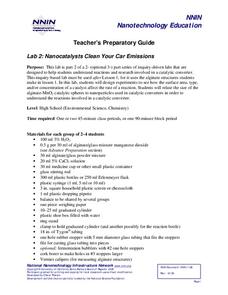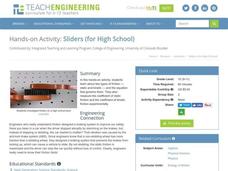Teach Engineering
Earthquakes Living Lab: Geology and Earthquakes in Japan
Sometimes it seems as if earthquakes hit the same places over and over again. Class members study Japan in order to determine why earthquakes keep happening there. Pairs work together to research and try to determine whether there are...
National Nanotechnology Infrastructure Network
Lab 2: Nanocatalysts Clean Your Car Emissions
Surface area certainly surfaces as a variable for chemical reaction rates. Scholars perform an experiment to discover how the size of catalysts affect the rate of a chemical reaction. They record their results in tables and graphs to...
Khan Academy
Challenge: Mouse Tracker
Create a small but useful little program that allows you move a dot with your mouse and see the coordinates change as the mouse moves. Starting with a dot that moves with the mouse, add to this program the text of the points coordinates...
Teach Engineering
Earthquakes Living Lab: Geology and the 1906 San Francisco Earthquake
We can learn from the past to protect the future. Pairs look at two historical earthquakes: San Francisco, Calif., and Kobe, Japan. Pupils compare the two earthquakes and their impacts, then determine how engineers may use the...
Serendip
Carbohydrate Consumption, Athletic Performance and Health – Using Science Process Skills to Understand the Evidence
Should athletes carb load before an event or consume carbohydrates during the competition? Scholars discuss how to set up a hypothesis and experiment to answer a question relating carbohydrates and athletic performance. Then, they read...
Curated OER
Congruent Rectangles
Very simply, geometers examine a pair of rectangles on graph paper and find a translation and rotation to demonstrate their congruence. A couple of questions follow to stimulate critical thinking about other possibilities.
Chemical Education Foundation
Teacher's Guide to Science Projects
Do you find the idea of having a science fair with all of your learners intimidating? Use a guide that provides everything you need to know to make project-based learning manageable. The resource includes options for four different types...
Teach Engineering
Sliders (for High School)
Slip sliding away. Groups investigates the two types of friction by running an experiment that allows them to calculate the coefficient of static friction and the coefficient of kinetic friction. The experiment uses a box, a basket, and...
Teach Engineering
Physics Tug of War
Slide books with a little assistance from Newton. Using books, groups create a demonstration of Newton's Second Law of motion. Pupils compare the distance traveled by one and two books when they apply a force to them.
Teach Engineering
Earthquakes Living Lab: The Theory of Plate Tectonics
Find out if your class agrees with Ice Age: Continental Drift ... or if it's just a fun family movie! Class members research the theory of continental drift, examine evidence of plate tectonics, connect this information to engineering,...
Teach Engineering
Swinging Pendulum
Get into the swing of things. Pupils use a pendulum to demonstrate the conversion of potential energy to kinetic energy and back. After measuring the speed of a pendulum and compare it to the calculated theoretical speed, they determine...
Teach Engineering
Energy on a Roller Coaster
Roll with your class into the idea of conservation of energy. Pupils use a roller coaster track to collect data to reinforce the concept of conservation of energy and the influence of friction. Class members then create a graph from...
Teach Engineering
Energy and the Pogo Stick
Let your class bounce to examine the concept elastic potential energy. Individuals bounce on a pogo stick in order to calculate its elastic potential energy. Groups then compare the elastic potential energy to the gravitational potential...
Teach Engineering
Preconditioning Balloons: Viscoelastic Biomedical Experiments
What does stretching a balloon have to do with equilibrium? Groups explore preconditioning by stretching a balloon to a point of equilibrium. They then measure the amount of force required to stretch the balloon to the same point several...
Teach Engineering
Microbes Know How to Work!
Scholars harness the power of microbes with an engaging activity that uses yeast to break down sugar in water. Multiple setups of the same experiment lets learners determine which temperature results in the fastest rate of sugar...
Social Skills Central
Don't Get Mad...
Pupils discover important alternatives to expressing anger and how to better manage their emotions through a collaborative discussion activity with their classmates. This resource includes nearly 100 (99, to be exact!) hypothetical...
Teach Engineering
Energy Skate Park
Skate through a simulation on energy with an a activity that uses a computer simulation of a skater to reinforce the concept of conservation of energy. The resource guides pupils through scenarios using the computer simulation to see the...
Teach Engineering
Exploring Acceleration with an Android
Small groups use rubber bands to accelerate an Android device along a track of books. They collect the acceleration data and analyze it in order to determine the device's velocity.
Teach Engineering
Rock Candy Your Body
Candy rocks! A sweet lesson offers a different take on the rock candy experiment. Groups use a supersaturated sugar solution to create rock candy. Pupils then add other ingredients to the solution to test their effect on the...
Serendip
UV, Mutations, and DNA Repair
How effective are cells at repairing UV damage? An inquiry-based lesson has learners experiment with organism by exposing them to various levels of UV light and then examining their DNA after a period of time. Pupils test different...
Serendip
Should You Drink Sports Drinks? When? Why?
New research proves even rinsing your mouth with carbohydrates without swallowing improves performance of the central nervous system. While some think sports drinks are amazing, others say they are a waste of money. Scholars learn about...
Other popular searches
- Experimental Design Diagram
- Experimental Design Labs
- Science Experimental Design
- Biology Experimental Design
- Experimental Design. Plants
- Experimental Design Anatomy
- Experimental Design Physics
- Health Experimental Design
- Experimental Design Problems
- Disease Experimental Design
- Experimental Design Plants






















